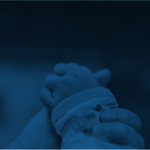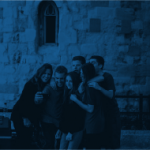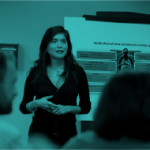For more than 30 years, Harder+Company has been a trusted partner for organizations working on diverse social issues. As these fields interact and overlap more and more, we share our expertise to help clients make new connections and share insights across sectors.

Health
Health systems in the U.S. are undergoing a major transformation. The health field is increasingly blending individual, population, and structural approaches to meet the care and prevention needs of entire communities. Many health-focused organizations are also making a stronger commitment to addressing broader determinants of health and advancing health equity.
Harder+Company works with diverse stakeholders—including funders, care providers, health departments, policy makers, community organizations, and residents—to advance lasting improvements in health and wellbeing. Among other things, we have experience planning and evaluating initiatives focused on systems integration, health equity, health impact assessment, and public health accreditation. Our team also offers specific content expertise in such areas as oral health, HIV/AIDS, reproductive health, healthy eating/active living, and aging.

Behavioral Health
The behavioral and mental health landscape is becoming more collaborative and integrated, with new bridges being built to fields like child welfare, criminal justice, and public health. The behavioral health field is also emphasizing prevention and recovery more than ever, while at the same time recognizing a greater need to innovate and assess impact.
We have a long history of supporting behavioral health agencies at the state and county levels—as well as their community partners—to plan, evaluate, and improve services for vulnerable populations. We have deep knowledge of a wide range of behavioral and mental health models—with particular understanding of programs and initiatives for hard-to-reach and underserved communities.

Early Childhood
The benefits of high-quality early care and education last a lifetime. Research shows that investments made in young children and their families can lead to dramatically better outcomes for individuals and communities over time. When these children become adults, they are more likely to graduate from high school, attend college, and be in good health. Improving the quality of early care and education settings can further enhance the benefits of attending preschool, particularly for children from low-income families.
Harder+Company has deep experience working with early care and education partners across the nation—including dozens of First 5 agencies throughout California. Our evaluation and planning efforts have addressed kindergarten readiness, quality rating and improvement systems, formal and informal systems of care, family support and engagement, home visitation, and systems change strategies.

Education
Strong schools pave the way for a lifetime of success. Educators, researchers, parents, and policymakers are all asking: How can education be transformed to improve opportunities for all students, especially in the face of fewer resources? This question is especially important as education systems strive to help students find academic and career success after high school.
Harder+Company works with schools and their community partners to assess the impact of initiatives that support academic achievement, college preparedness, and youth leadership, particularly ones that improve opportunities for low-income youth. We help clients explore how communities and families involve themselves in schools, how community agencies become part of service networks for student development and wellbeing, and how different approaches to learning strengthen knowledge and skills.

Children, Youth + Families
A family’s ability to access and use prevention and intervention services for children and parents/caregivers can have a major impact on children’s later success in life. This is true from early childhood up through the stage when young people transition into adulthood. The systems of care that support these families are at their best when they are working to remove barriers and promote trauma-informed, evidence-based services.
Harder+Company has decades of experience helping organizations to advance the wellbeing of vulnerable children, youth, and families. We have supported initiatives that focus on child abuse prevention and intervention; foster care; home-based family support; transitional and independent living; and early intervention. We have also worked extensively with public systems to develop quality improvement plans and practice frameworks, as well assess the needs of community members and service providers.

Equity + Place
Uneven access to opportunities and resources in our society is rooted in a long history of discriminatory practices and policies—especially along lines of race. To dismantle the effects of such discrimination and advance a more equitable society, some funders, nonprofits, and public agencies are taking place-based approaches focused on strengthening entire communities.
Harder+Company frequently works with organizations to better understand the impact of their equity-focused and place-based efforts. We work across sectors and fields to help clients examine issues of power and inequality in health outcomes, social and academic achievement, housing quality, community safety, and more. We use a range of developmental techniques to help community partners surface issues in real-time, learn from one another, and re-calibrate strategies.

Housing + Community Development
Strong communities begin with stable, affordable housing and accessible community institutions. Creating greater access to housing and empowering people to create change within their own communities are crucial to the long-term health of a city or town—and are the foundation from which educational opportunity and economic growth can emerge.
We offer substantial experience leading research, evaluation, and planning projects related to housing, homelessness, community development, and neighborhood change. Our work has involved assessing the need for housing for a wide range of populations (such as transition age youth, the chronically homeless, and people with mental health needs), working with communities to support collaboration across sectors to address and fund housing option across a wide spectrum of need, and evaluating services necessary for people to stay stably housed or transition to more independent housing.

Criminal Justice
Today’s criminal justice system is under intense scrutiny, as activists and policymakers push for reforms that emphasize prevention, rehabilitation, and the reduction of racial disparities. In many states, these reforms include efforts to reduce the prison population and remove barriers to successful reintegration for individuals returning home from prison. Criminal justice agencies are looking more closely at what they are doing and the impact they have on individuals and communities.
Harder+Company supports public sector and nonprofit clients to evaluate criminal justice-focused initiatives, including gang prevention and intervention, wraparound legal services for victims of crime, recidivism reduction, and the assessment of law enforcement policies and practices. Often these projects bring together partners from criminal justice agencies and human service systems to coordinate efforts toward the common goals of improving community well-being and public safety.

Arts + Culture
The arts and culture sector is in a period of incredible diversification—in terms of the disciplines, formats, and traditions represented, as well as the communities producing and engaging with the arts. Many public and private arts funders are especially concerned with how to support arts organizations in fostering cultural participation and taking artistic risks.
At Harder+Company, we apply our research, strategy, and community engagement skills to help the arts and culture field become more sustainable and connected to the public. We assist arts funders in examining the organizational effectiveness of arts nonprofits, assess diversity and equity in arts funding and capacity building, measure the impact of audience and community engagement strategies, and assess leadership development for arts organizations.
